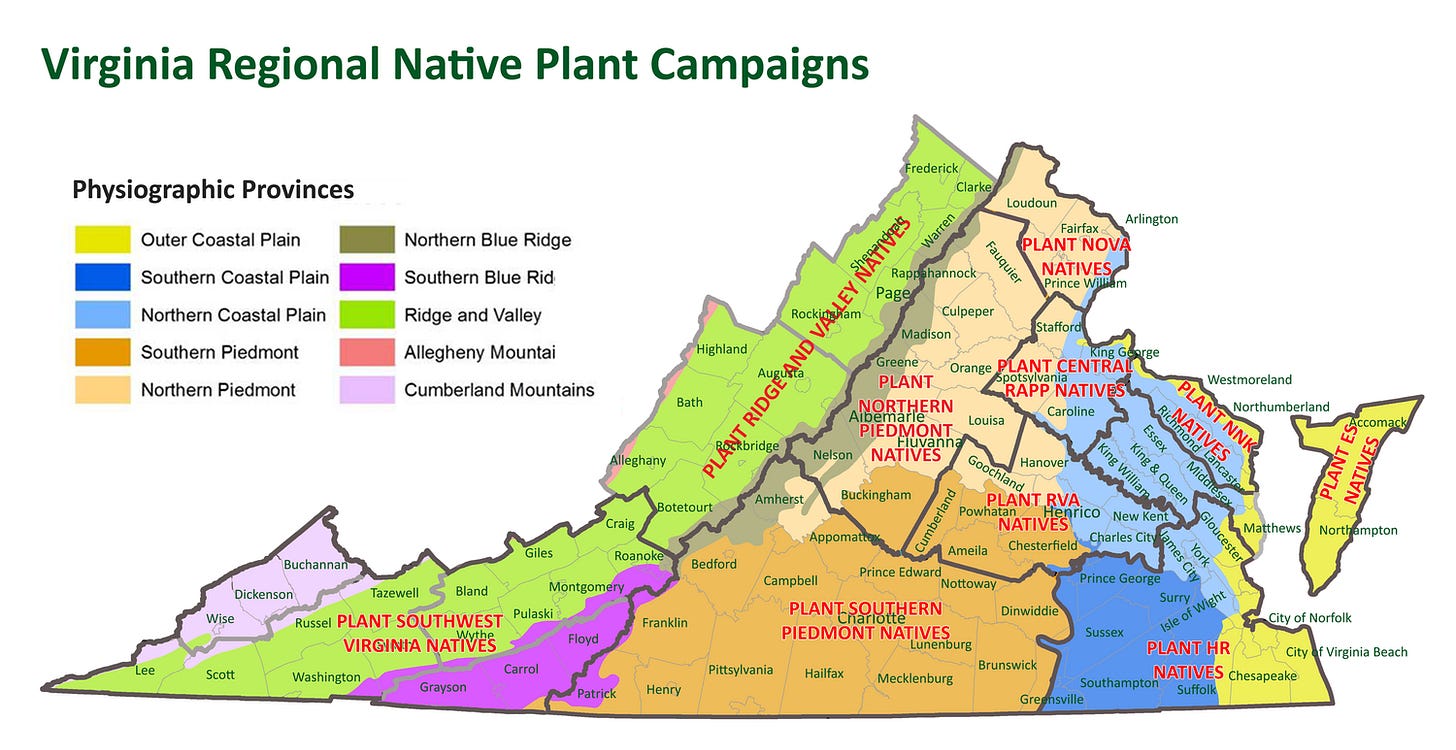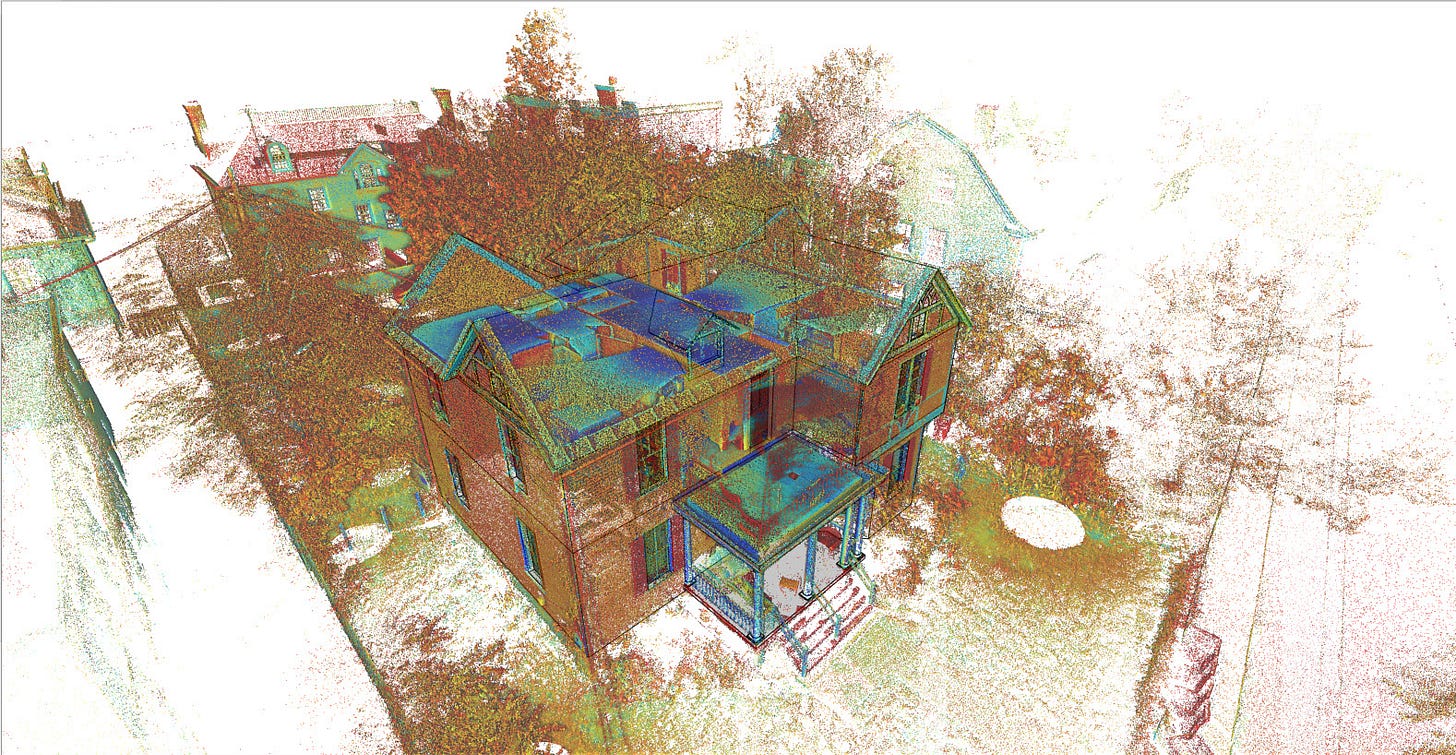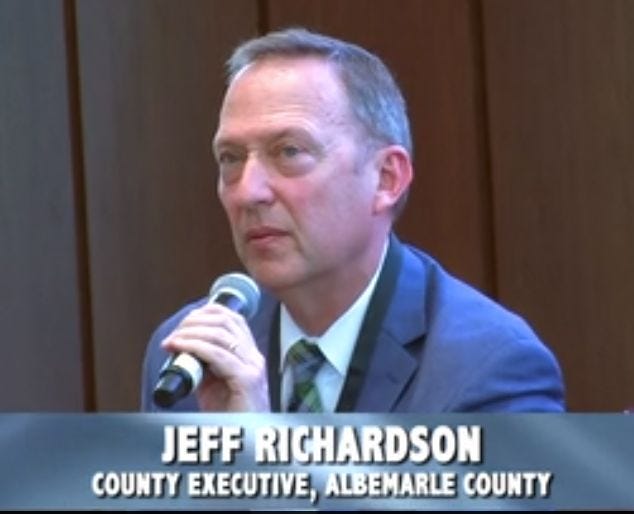May 15, 2025: Charlottesville announces new city attorney, release of community survey
Plus: The second part of a summary of a Tom Tom conversation with area leaders
On the Ides of May, 1619, astronomer Johannes Kepler changed his mind about rejecting a discovery he had made earlier in the year. Kepler had published work in 1609 that demonstrated how planetary orbits work in an elliptical manner rather than a circular one and his final calculations caused him to complete his laws of planetary motion. Charlottesville Community Engagement is not about the finer points of how our solar system works, but there are metaphors that many readers may find useful. I’m Sean Tubbs, and one day I’ll figure something out.
In today’s installment:
Charlottesville hires someone from North Carolina to serve as managing director of the City Attorney’s office
Charlottesville releases the online version of a survey to inform creation of the city’s next strategic plan
The second half of a conversation between Albemarle County Executive Jeffrey Richardson, Charlottesville City Manager Sam Sanders, and University of Virginia President Jim Ryan
First shout-out: Plant Virginia Natives
Spring is here and there’s still time to plan for upgrades to your outdoors. You can take some time to get ready for spring! Check out Plant Virginia Natives!
Plant Virginia Natives is part of a partnership with ten regional campaigns for ten different ecosystems across Virginia, from the Northern Piedmont to the Eastern Shore. Take a look at the full map below for the campaign for native species where you are in the Commonwealth. For the Charlottesville area, download a free copy of the handbook: Piedmont Native Plants: A Guide for Landscapes and Gardens.
Plant Northern Piedmont Natives is for anyone who works with native plants, whether you are a property owner, private consultant, landscape designer, nursery operator, conservation group, or local government.
One correction from #864:
The segment from the Tom Tom Festival originally described the size of Albemarle and Charlottesville in acres rather than square miles. I regret the error.
Charlottesville hires managing director to run city attorney’s office
Charlottesville has been without an official City Attorney since April when the previous person to hold the job was placed on administrative leave. Since then the city has hired the services of the firm Sands Anderson to provide legal advice on a wide variety of issues.
On May 14, John Maddux began his new job as managing director of the city attorney’s office.
“He will be joining our team as the managing director of the office working with on-going Acting City Attorney Pam O’Berry who is with the Sands Anderson law firm,” said Charlottesville City Manager Sam Sanders to City Council at their meeting on May 7.
Sanders said Maddux had to be approved to join the Virginia State Bar in order to take the position. He’ll formally assume the position of City Attorney after being sworn in by the Virginia Supreme Court and a formal vote by City Council to approve his appointment.
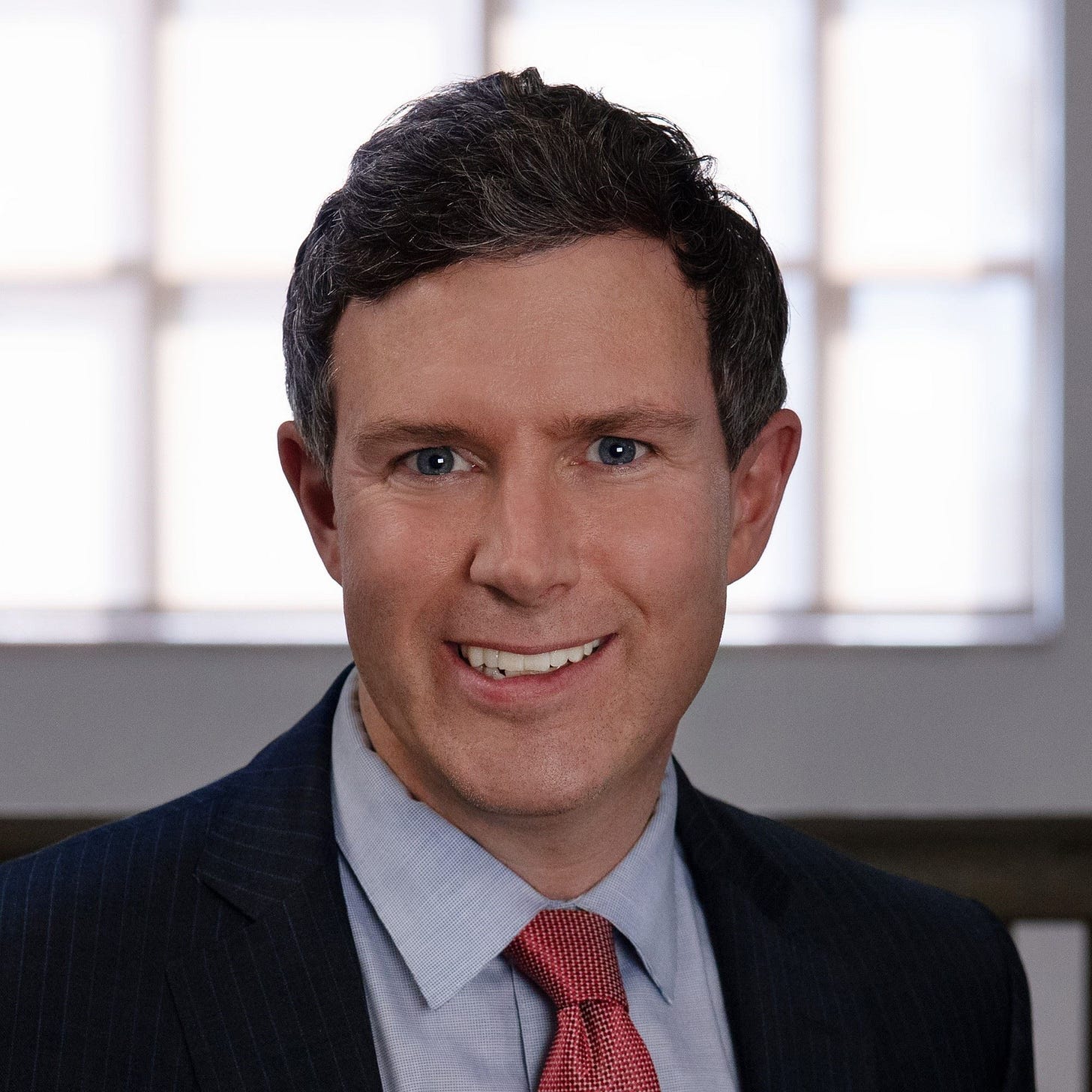
Maddux comes to the area from Asheville, North Carolina where he served as deputy city attorney for over ten years.
“The best legal work in local government happens through strong partnerships with council, staff, and the community,” said Maddux in an information release. “I’m looking forward to bringing that approach to Charlottesville.”
One of the tasks ahead for Maddux is to fill a number of vacancies in the office. Sanders told Council there are five.
“He will get to work on that immediately as well as working with me on some policy and procedure reviews for things that we need to get done,” Sanders said.
One item the city faces is an ongoing lawsuit seeking to overturn the city’s Development Code. Charlottesville has hired the firm Gentry Locke to assist in the defense of an allegation that the city did not follow state regulations that plaintiffs in White v.Charlottesville argue required more coordination with the Virginia Department of Transportation before adopting the new zoning code.
Most recently, Circuit Court Judge Claude Worrell Jr. declined to grant a request from the city that he reconsider an April 16 decision to allow the case to proceed. Read that story here and there are links to the rest of the coverage that you’ll only get from Town Crier Productions.
Online version of Charlottesville Community Survey now live
Charlottesville is in the early stages of creating a new strategic plan to replace one adopted in September 2023. Such documents guide the work of city employees and guide how money is spent.
Today city officials have announced the release of an online survey to accompany a paper one being sent to random city households. (take the survey)
“We are excited to receive more input from the community to guide our strategic outcomes and future work,” said City Manager Samuel Sanders, Jr. in an information release. “The survey will help us get a current baseline understanding of our services and allow us to measure our impact going forward.”
The city has commissioned the National Research Center at Polco to use their National Community Survey template to receive the feedback. The survey is open to people over the age of 18. Questions cover a wide range of topics including public safety, inclusivity, the natural environment, public utilities, and urban design.
“We need as many voices as possible to ensure our decisions reflect the needs of the entire community,” Sanders said.
The survey is open through May 28.
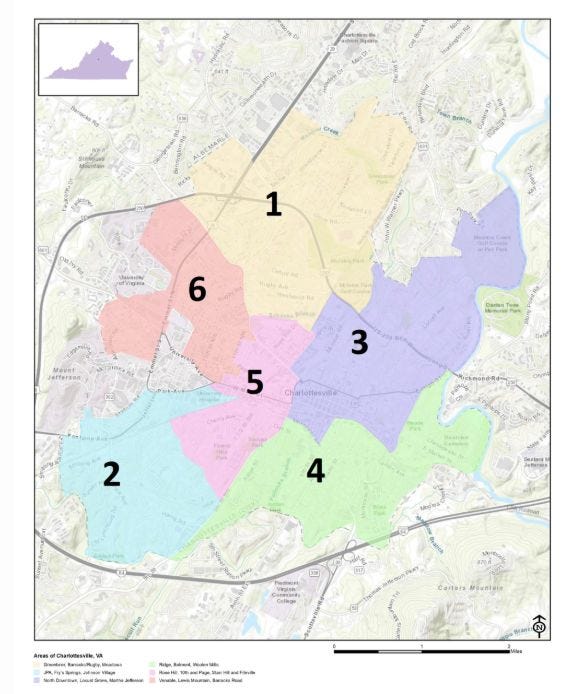
Second-shout out: Design Develop
In today’s Patreon-fueled shout-out, architectural firm Design Develop is offering a new service aimed at the development community that the rest of us might want to know about , too — 3D point cloud scanning! This technique uses specialized equipment, such as 3D scanner systems, to gather a large amount of data points that represent the surface of the scanned object or scene. This really comes in handy when working with historic structures, as the firm knows from its experience in Baltimore and Charlottesville. Read their blog post for more information!
The applications of 3D point cloud scanning are extensive and cover various fields, including architecture, construction, cultural heritage preservation, virtual reality, industrial design, manufacturing, and more. These applications require accurate 3D spatial information, and Design Develop’s workflow provides precise and comprehensive results, all while being more cost-effective than traditional methods.
Design Develop has expertise in this workflow for their own needs and now has a dedicated team offering this service in the Charlottesville and Albemarle Area. If you're involved in the real estate, design, or construction industry, contact them for more information or a free quote.
Visit their website for an introductory video that captures the 3D point cloud scanning of the Downtown Transit Center and a booklet that will explain more!
Richardson, Ryan, and Sanders tackle economic growth, cooperation on solving problems at Tom Tom Festival
Yesterday’s edition of the newsletter contained the first part of a two-part summary of a Tom Tom Festival presentation from April 16 on the state of the community. Former Congressman L.F. Payne interviewed Charlottesville City Manager Sam Sanders, Albemarle County Executive Jeffrey Richardson, and University of Virginia President Jim Ryan.
In the first section, we learn that the three get together once every two month for a discussion. City Manager Sam Sanders said that allows them to have tough conversations. That caused President Ryan to make a comment.
“I'm still thinking in my head about Sam saying the conversations are going to get tougher,” Ryan said. “I'm just wondering what you had in mind.”
That was a month ago and before the federal government did their best Lucy Van Pelt impression and rescinded an offer to give the former Federal Executive Institute to the City of Charlottesville. UVA will instead be given the surplus property, an action that has prompted an outcry.
The future offers more possibilities as the University of Virginia continues to spend billions on construction projects.
“I would say the biggest thing on the horizon is the Manning Institute for Biotechnology, which is being built at the Fontaine Research park, which is at the far end of Fontaine near U.S. 29,” Ryan said. “It will be a 350,000 square foot research facility focused on translational research, largely focused on gene and cellular therapies, which have proven quite promising in terms of mitigating or curing diseases that have been beyond reach.”
Ryan said the accelerator being run by Cville BioHub at the North Fork Discovery project will wind up being one of the most significant things to happen to the region in ten years. One story I want to follow up with is a workforce study Cville BioHub commissioned to give a sense of what jobs might be available for community members.
Ryan also cautioned that too much growth prompted by UVA expansion can hurt the overall community.
“We need to be really careful about growth, I think, because that's what could kill the area in some ways,” Ryan said. “So it's this very fine balance, I think, in terms of the future.”
Ryan told the story of one recent startup that has located at the North Fork Research Park. He said the CEO wanted to escape Silicon Valley where both traffic and schools have become too congested.
“It makes you realize that if you're going to attract these businesses, you have to retain what makes Charlottesville Charlottesville, or you might be killing the goose that laid the golden egg,” Ryan said.
Albemarle County Executive Jeffrey Richardson said there are constraints on growth in a county that has decided to limit development to a small portion of its geography.
“I want you to just tell yourself, 95 percent of the county does not have access to water and sewer,” Richardson said. “Growth follows water and sewer. Without water and sewer, you don't grow.”
Richardson said that was a conscious choice made in the 1980’s that has continued through every Comprehensive Plan to date. He said that for continue, the county must work to make the designated growth areas a place that can support density. A crucial task is to improve the transit system.
“I believe heavily in the decisions that were made in the early 80s to keep this county, the rural areas of our county, rural,” Richardson said. “But it really, at this moment in time of where we're at, it really puts a lot of pressure on the city and the county to make good decisions about where development should go and what it should look like and how we maximize that.”
Richardson said Charlottesville and Albemarle combined have only a fraction of the resources available to the University of Virginia but increasingly he and Sanders will be vocal about how UVA growth affects municipal needs such as having enough places for people to live.
“Affordable housing is a huge challenge,” Sanders said. “Housing availability, period, is a huge challenge. Until we can get our arms around that, we're going to continue to lose the population of people who really want to be here.”
Sanders said he needs the city to grow in population so that there is more funding for services and infrastructure.
“I still have schools that I need to update,” Sanders said. “I still have climate priorities. I still have wealth building priorities for low income populations in the city. I still have a housing crisis. So all of that takes balance and we've got to measure those things and we've got to be creative about what we do.”
For the last question, the panel was asked to identify ways in which the nonprofit community and other stakeholders can partner with local government and UVA.
Sanders said he hoped those in the community can begin to promote it and recognize that progress has been made in recent years.
“I think we should appreciate and applaud ourselves for that because there are a lot of communities that are not doing this,” Sanders said.
Sanders also noted that the Downtown Mall turns 50 next year at the same time that the county will celebrate the 250th anniversary.
“Monticello is going to be a part of the bigger conversation about Virginia 250,” Sanders said. “All of that's happening the same weekend next year.”
Richardson said he needs more in the community to understand why the county is pursuing economic development efforts. He added more is needed to make sure people who live here now benefit from the activity.
“We need the University of Virginia at the table with us as a catalyst,” Richardson said. “For Sam and I, one of the biggest issues is workforce development in this community. And there's a lot of workforce development efforts that are going on. We learn about stuff almost every week about things that are happening.”
Ryan said he wants there to be more collaboration between the three entities on ensuring the community is prepared for the growth that might come with economic development.
“Regional transportation is one, but more generally, and I think we're laying the groundwork for this, I would love to see this collaboration continue, but on a foundation of an entrepreneurial mindset,” Ryan said.
And that was the end of the presentation. What will this conversation be like in a year?
To watch the whole thing, see below. There are only 51 views! Let’s make it 60!
Reading material:
U.Va. loses over $60 million in federal research cuts, Bertie Azqueta, Cavalier Daily, May 12, 2025
BAR will consider request to demolish one of Charlottesville’s oldest houses, Sean Tubbs, C-Ville Weekly, May 13, 2025
Rescue crews locate body of missing Albemarle boy after flooding in area, Anastasiia Carrier, Charlottesville Tomorrow, May 14, 2025
Supervisors learn $1.5 million in back taxes collected, Heather Michon, Fluvanna Review, May 15, 2025
Federal funding for libraries on the chopping block, Page H. Gifford, Fluvanna Review. May 15, 2025
‘Absolute shock’ at Charlottesville City Schools over FEI retraction, Hannah Davis-Reid, VPM News, May 14, 2025
The way #865 ends
There are more stories to get to today but I got a late start on this side today. I dragged my feet doing an edition of Fifth District Community Engagement. Today I feel somewhat bogged down by having a lot of stories with loose ends. The current system of posting stories here and then posting them to Information Charlottesville is not the most efficient but I want to explain the logic.
Stories posted here are usually the first version. The idea is to add additional information that may have come in since publication. For instance, the IC version of yesterday’s story on the Board of Equalization now has additional information about historical data going back six years. I even made a graphic! It’s rudimentary, but then again, so am I!
There are about four or five other stories I need to post. Sometimes I use the stories to write a new version for C-Ville Weekly because I don’t want to just recycle these stories. I’m beginning to develop a separate process for that work because I’m glad to be part of their team.
Sometimes I decide not to include a story on the archive site. These are usually the stories where something is happening in the moment, but I don’t have enough to include a longer version.
In the future there will likely just be one place I write. For now I’m trying to get as much information out as I can to satisfy my need to document as possible. Something bigger than me is driving the work and I’m grateful to those who have decided to contribute.
Anyway, this is just the first part. I watch this and I’m back there just as I’m here hitting publish.




